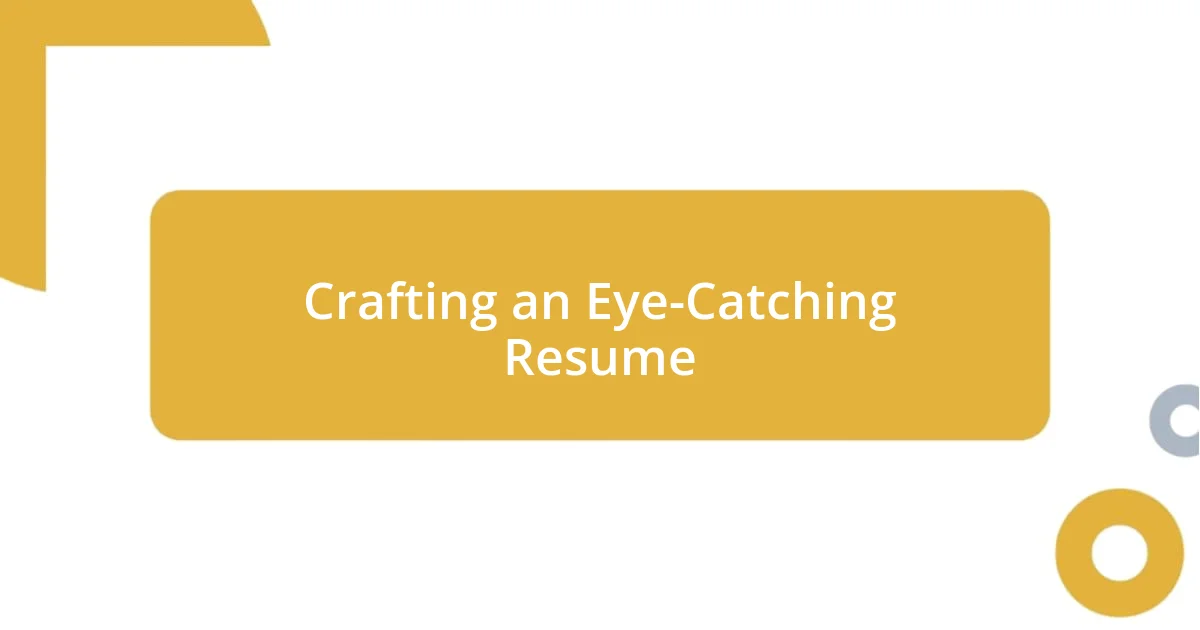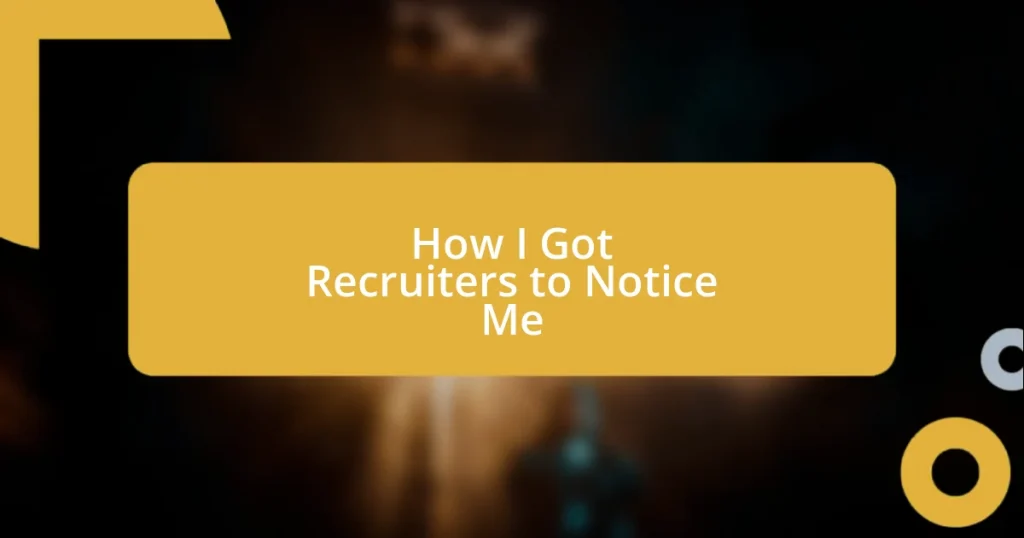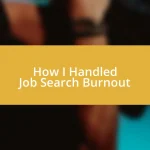Key takeaways:
- Tailor your resume and application materials to align with specific job descriptions and company culture, enhancing clarity and relevance.
- Leverage social media platforms like LinkedIn to network and engage with industry professionals, showcasing your expertise and building connections.
- Follow up after interviews and networking events with thoughtful messages to reinforce your interest and maintain professional relationships.

Understanding Recruiter Expectations
Recruiters tend to prioritize clarity and relevance in your application materials. I remember a time when I crafted my resume, focusing on a specific role I was excited about. Instead of a generic list of achievements, I tailored my experiences to match the job description. Have you ever received feedback that your resume felt too broad? Personalizing your documents can truly make a difference.
Understanding what recruiters expect goes beyond just the resume. They are looking for candidates who not only fit the qualifications but also align with the company culture. I once landed an interview after doing a bit of homework on the company’s values and reflecting those in my cover letter. It’s crucial to ask yourself: Are you showcasing not just your skills, but who you are as a potential team member?
Additionally, responsiveness plays a key role in how recruiters perceive candidates. I recall the first time I received a call for an interview—I was thrilled but also made sure to respond promptly. That quick communication demonstrated my enthusiasm and professionalism. How do you think your response time affects a recruiter’s decision? Understanding their expectations can empower you to stand out through every interaction.

Crafting an Eye-Catching Resume
Crafting a resume that stands out isn’t just about listing your work experience; it’s about creating a narrative that resonates with recruiters. I remember when I redesigned my resume to highlight not just my roles, but the impact I made in each position. This shift not only made my resume visually engaging but also drew attention to my achievements in a way that felt personal and purposeful. When constructing your resume, consider what truly sets you apart.
Here are some key strategies for making your resume eye-catching:
– Use Action Verbs: Start each bullet with strong verbs like “achieved,” “developed,” or “led” to create a sense of dynamism.
– Tailor for Each Job: Customize your resume for the specific job by aligning your experiences with the listed qualifications.
– Incorporate Numbers: Whenever possible, quantify your accomplishments, as this provides concrete evidence of your impact.
– Keep it Concise: Aim for a one-page resume unless you have extensive relevant experience. Clear, concise content is more likely to hold a recruiter’s attention.
– Choose a Clean Format: Use easy-to-read fonts and plenty of white space to avoid overwhelming the reader. A visually appealing layout makes a stronger initial impression.
In my own experience, I found that even small design elements, like strategic use of color or icons, can make your resume pop while still maintaining professionalism. It’s all about striking that balance that gets you noticed!

Leveraging Social Media Platforms
Leveraging social media can significantly boost your visibility to recruiters. I’ve seen firsthand how platforms like LinkedIn can be a goldmine for networking. One time, I casually shared an article related to my industry, and a recruiter reached out to me within hours, expressing interest in my insights. It’s fascinating how a simple post can lead to unexpected connections, right?
Another effective strategy is engaging in relevant groups or forums. I remember joining a few professional groups on LinkedIn, where I participated in discussions and shared my industry knowledge. Not only did these interactions enhance my visibility, but several recruiters took notice of my contributions. Have you explored niche groups relevant to your field? You might just find a vibrant community that opens doors.
Lastly, don’t underestimate the power of your personal brand. I realized early on that my profile photo and bio needed to reflect professionalism while still showcasing my personality. When I updated my photo to be more approachable and tweaked my bio to highlight my passion for my field, I started getting connections from recruiters who resonated with my story. What steps are you taking to perfect your online presence? Building a strong, authentic online persona can make a world of difference in attracting the right attention.
| Social Media Platform | Potential Benefits |
|---|---|
| Networking, job postings, professional visibility | |
| Real-time updates, industry conversations, following thought leaders | |
| Community groups, informal connections, job shares |

Networking with Industry Professionals
Connecting with industry professionals can be a game-changer in getting noticed by recruiters. I recall attending a local meet-up in my field, where I struck up a conversation with a senior manager from a company I admired. Not only did we exchange business cards, but we also bonded over a shared passion for innovation in our industry. That interaction eventually led to an informal coffee chat and, ultimately, a referral to a job opening. Isn’t it amazing how a casual conversation can pave the path to new opportunities?
Moreover, I’ve learned the importance of following up after a networking event. There was a time I met a recruiter at a conference, and I took the initiative to send a personalized LinkedIn invite the next day. In my message, I expressed my appreciation for their insights during their presentation. This simple gesture not only kept the connection alive but opened the door for further dialogue about job openings down the line. How are you nurturing your networking relationships?
Additionally, I strongly encourage considering a mentor in your field. I once had a mentor who not only guided my career path but also introduced me to influential contacts in my industry. Their support made me feel supported and provided me access to new opportunities I wouldn’t have found on my own. Do you have someone who inspires you? Building these kinds of relationships can truly make a difference in your professional journey.

Personalizing Your Outreach Strategy
Personalizing your outreach strategy can be a game-changer in catching the attention of recruiters. I remember crafting a message that addressed a specific project a recruiter worked on, and to my surprise, they responded with enthusiasm. It felt rewarding to know that my effort to personalize my outreach resonated with them—showing my genuine interest not only made my message stand out but also established a connection right from the start.
One time, after researching a company I was interested in, I sent a tailored email to the hiring manager, mentioning the recent initiative they launched. I shared my perspective on it and how my background could complement their goals. The response was overwhelmingly positive; the hiring manager appreciated the thoughtfulness and even invited me for an informal chat. Have you thought about how your insights can align with the company’s mission? Personalizing your approach can demonstrate that you’re not just another candidate but someone genuinely invested in what they do.
Another powerful tactic I’ve found useful is to follow up on mutual connections or shared experiences. After meeting someone at a conference who introduced me to a recruiter, I reached out with a brief note about how I enjoyed our conversation and expressed interest in opportunities at their company. It’s these small, thoughtful gestures that can leave a lasting impression. Have you considered how a simple follow-up can pave the way for a meaningful dialogue? Engaging personally shows you’re serious and interested, increasing the chances of being remembered positively.

Preparing for Interviews Effectively
Preparing for interviews isn’t just about practicing responses; it’s about total immersion in the role and company. When I was gearing up for an interview at a tech startup, I spent hours reading their blog posts and following their social media. As I sat down for the interview, it felt like we were already having a conversation. I was genuinely excited to discuss how my skills could contribute to their upcoming project. Have you ever noticed how familiarity can create confidence?
I also believe it’s crucial to have a mock interview with a friend or mentor. I distinctly remember a session where my friend grilled me with tough questions, pushing me to think on my feet. The feedback I received was invaluable. I learned to articulate my thoughts clearly and project confidence—even if I stumbled initially. Isn’t it interesting how a bit of pressure can reveal strengths and weaknesses?
Lastly, I emphasize the power of physical preparation. On the day of an important interview, I chose an outfit that made me feel both professional and comfortable. Wearing something that boosts your confidence can have a profound impact on your performance. It might sound trivial, but feeling sharp and polished allowed me to focus fully on the conversation instead of worrying about how I looked. What do you think your attire says about you in an interview setting?

Following Up for Opportunities
Following up on potential opportunities can often feel daunting, but I’ve learned that a short, thoughtful message can make all the difference. After an initial conversation with a recruiter about potential roles, I took the initiative to send a brief thank-you note. Not only did it reaffirm my interest in the position, but it also put my name back in their minds. Have you ever considered how a small gesture like this could keep the door open for future interactions?
There was a time when I applied for a job but hadn’t heard back after a few weeks. Instead of letting it slide, I reached out to inquire about my application status. In my message, I expressed my enthusiasm for the company’s mission and reminded them of a key point from my resume that matched their requirements. To my delight, I received a response the very next day, leading to an interview. Aren’t you curious about what a simple follow-up could reveal about your application?
Following up doesn’t have to be limited to just job applications; it can extend to networking events too. After meeting someone at a workshop, I sent a note referencing our discussion about shared interests in industry trends. This approach not only reignited our conversation but also fostered a deeper professional connection. How have you leveraged follow-ups to maintain relationships and uncover new opportunities? I genuinely think these moments can turn casual meetings into valuable partnerships.















